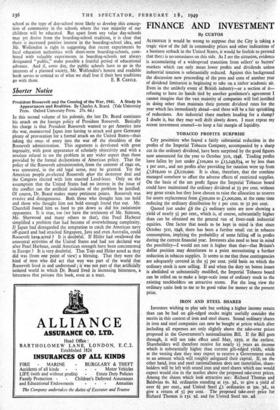Shorter Notice
IN this second volume of his polemic, the late Dr. Beard continues his attack on the foreign policy of President Roosevelt. Basically his charge is that President Roosevelt wanted to get America into the war, manoeuvred Japan into having to attack and gave Germany plenty of provocation for a formal attack on the United States—thus taking the onus of entry into the war off the shoulders of the Roosevelt administration. This argument is developed with great ingenuity, with great appearance of scholarly objectivity and with a resolute refusal to see the problem in any wider aspect than those provided by the formal declarationS of American policy. That the policy of the Roosevelt administration, from the summer of 1940 on, was unneutral, in the old legal sense, may be granted. Yet the American people ,re-elected Roosevelt after the destroyer deal and the Congress elected with him enacted Lend-lease. Only on the assumption that the United States had no interest in the issue of the conflict can the artificial isolation of the problem be justified. Of course, Dr. Beard makes many pertinent points. Roosevelt was evasive and disingenuous. Both those who thought him too bold and those who thought him not bold enough found that out. Mr. Churchill found him as hard to pin down as did his isolationist opponents. It is true, too (we have the testimony of Mr. Stimson, Mr. Sherwood and many others to that), that Pearl Harbour simplified a problem that had become of overwhelming complexity. If Japan had disregarded the temptation to catch the American navy off-guard and had attacked Singapore, Java and even Australia, could Roosevelt hav* acted ? It is doubtful. If Hitler had swallowed the unneutral activities of the United States and had not declared war after Pearl Harbour, could American strength have been concentrated in Europe ? It is very doubtful. That Tojo and Hitler acted as they did was (from one point of view) a blessing. That they were the kind of men who did act that way was part of the world that Roosevelt lived in and understood ; it was not part of that artificially isolated world in which Dr. Beard lived in increasing bitterness, a bitterness that poisons this book, even as a tract.






































 Previous page
Previous page